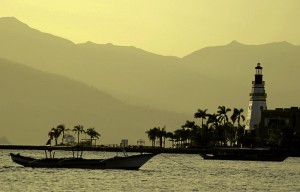
THE SUBIC BAY is a vital part of the life and livelihood of communities in and around the Subic Bay Freeport in Zambales and Bataan. EV ESPIRITU
The Subic Bay, one of the country’s top tourism destinations, possesses a deep harbor protected by mountains and the Grande Island, making it an ideal port for vessels and site for the once US naval base—the American government’s largest military installation outside of the mainland from the late 1940s to the early 1990s.
The bay area is now seen as a model for bases conversion, having successfully transformed itself into an economic hub run by the state-owned Subic Bay Metropolitan Authority (SBMA). Its strategic location in Asia, which puts it near emerging powers like China, has continued to make it attractive to American forces, hence the frequent visits of US vessels and nuclear submarines to the port.
But as a 2010 the Philippine Daily Inquirer report made clear, the Subic Bay remains a threatened asset. The stench emanating from the polluted Kalalake River is still unbearable to thousands of workers who go through the port’s gates every day.
The recent controversy involving allegations of waste dumping by a US Navy contractor within or near the bay has shown that a clear and present danger to the water body still exists.
As early as 2010, then SBMA Administrator Armand Arreza asked communities around the port and their leaders to heed the warning signs. “[The] Subic Bay may cease to serve as the economic lifeblood of the free port if the stresses affecting the water quality in the bay are left unchecked,” he said.
“If the degradation continues, we would lose our beautiful beaches, fishermen would have less fish to catch, the bay would become murky and silted, and ultimately, the Subic Bay Freeport would become less attractive to investors and tourists,” he added.
The Kalalake River, named by American soldiers once stationed at the naval base as “Shit River,” joins another Olongapo waterway and empties into the Subic Bay. In its current state, the river is symptomatic of the dangers and problems stemming from decades of
neglect and environmental decline.
Arreza said the Subic Bay, which forms part of the communal waters of Olongapo City, Zambales and Bataan, is considered a “threatened resource” due to patches of pollution caused by the disposal of partially treated sewage, nutrient inflows from changes in land use and inadequate treatment of industrial wastes.
Olongapo Mayor James Gordon Jr. said Subic Water—
which supplies both the city and the free port—had a provision in its contract to provide a sewerage system for the city. This would have addressed the concerns about domestic wastes coming from Olongapo into the bay, he said.
Subic Water, in a statement, said the firm was bound by its contract to rehabilitate and upgrade the existing water and sewerage facilities of Olongapo and the Subic Bay Freeport.
Timothy Desmond, president of the marine theme park, Ocean Adventure, said his firm, Subic Bay Marine Exploratorium Inc. (SBMEI), was deeply concerned about the increasing threats to the bay.
“As life-long conservation educators, the owners of SBMEI understand the unique environmental value of the bay. We strongly feel that the environmental protections for the bay are on the verge of collapse. Our business model is totally dependent on a healthy bay,” he said.
Ocean Adventure’s dolphins are kept in open water and are exposed to everything that all the other marine life in the bay are exposed to, he said. “We cannot sit quietly by while the environment that we are so dependent upon is degraded.”
The waste dumping incident involving Glenn Defense Marine Asia Philippines is “just the tip of the iceberg,” Desmond said, noting that a major oil spill in the bay happened in July but it was dismissed by the SBMA’s seaport department only as an “oil sheen.”
Berkman report
Danny Piano, president of the Subic Bay Freeport Chamber of Commerce, said preliminary results of the Programmatic Environmental Performance Report and Management Plan conducted by Berkman Systems Inc. for the free port this year were “upsetting.”
The SBMA contracted Berkman in September 2011 for the environmental study and initial results were presented to port stakeholders, including Piano, in August.
The study, which will cost the SBMA P7 million, includes the collection of air and water quality data, flora and fauna inventory and the determination of the environmental carrying capacity of the Subic Bay Freeport.
Piano said: “The level of coliform, a bacteria commonly used as an indicator of the sanitary quality of water, is unbelievably high.” Citing that the Department of Environment and Natural Resources water quality standard for total coliform is 1,000 mpn/100ml (most probable number of coliform per 100 milliliters of water), he said the average downstream coliform level in all 13 rivers (within the bay) was more than 800,000 mpn/100ml.
For heavy metals, three elements—cadmium, lead and mercury—exceeded the standards, he said.
“The alarming levels of coliform, cadmium and mercury will be very difficult and very expensive to fix. It will require tons of money, it will require political will from local governments around the bay, it will require cooperation from all stakeholders,” he said.
But SBMA Chair Roberto Garcia said the Berkman report has yet to be completed. The report, according to an SBMA official, was only in its preliminary stages and many things had to be done and clarified.
“Where were the samples taken? If it were near the Matain or the Kalaklan rivers, that was expected (to show high levels of pollutants). The domestic waste from Olongapo flows through there into the bay,” said the official, who asked not to be named for lack of authority to speak on the issue.
In a statement released last month when the Glenn Defense waste dumping issue triggered a Senate inquiry, Garcia said: “Latest tests show that the Subic Bay’s waters remain clean, safe and continue to be within normal levels.”